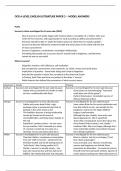Essay
A* A-Level American Literature Essays
- Institution
- OCR
Comprehensive model essays from an A*A*A* student now studying English Literature at the University of Cambridge. This document contains 4 fully-developed comparative essays (focusing on Fitzgerald's 'The Great Gatsby' and Nella Larsen's 'Passing') and 1 full-length response to the 2021 unseen extr...
[Show more]



